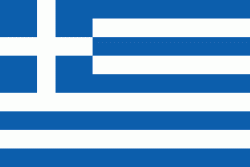Karlovasi (Néon Karlovásion)
Karlovasi (Καρλόβασι) is a town, a municipal unit, and a former municipality on the island of Samos, North Aegean, Greece. Since the 2019 local government reform it is part of the municipality West Samos, of which it is a municipal unit and the seat. It is located on the northwest side of the island and it is considered the commercial center of the island. According to the 2011 census, the population of the municipal unit was 9,855 inhabitants. Its land area is 100.330 km2. The municipal unit shares the island of Samos with the municipal units of Vathy, Pythagoreio, and Marathokampos. The School of Sciences of University of the Aegean is located in the town and currently there are three academic departments: There are over 1,000 active students living in the town throughout the year.
* Department of Mathematics
* Department of Information and Communication Systems Engineering
* Department of Statistics and Actuarial - Financial Mathematics
Karlovasi is a town with a rich cultural and industrial history, being a flourishing tannery and tobacco manufacturing center in the early 1900s. Many magnificent neoclassical mansions can be seen from that period as well as the remains of the large stone-built factories at the "Ormos" seaside. The town's economy shifted to trade after World War II and the collapse of the leather market. Pottery and brick-making became a flourishing business due to the rare quality of the soil in the environs of Karlovasi while the town's market was continuously growing to become the largest and most important in the Island. The connection of the Karlovasi Port with Seferihisar's Sığacık, in Turkey, brings a large number of travelers in the island.
Lykourgos Logothetis, the island's leader during the Greek War of Independence was born here in 1772. Karlovasi is also closely linked to Yiannis Ritsos, one of the country's most important poets, who spend most of his summers in his Karlovasi house, now the residence of his daughter, author Eri Ritsou.
Karlovasi has an unusually large number of almost cathedral-size churches, due to the fact that the modern town was formed by the unification of four smaller ones, all of them hometowns of wealth patrons such as tannery moguls and ship owners. The main touristic sights are the Tannery Museum, the Folklore Museum, the 11th century church of Metamorfosis, the church of Agia Triada at Paleo Karlovasi and the adjoining Venetian castle at Potami. The waterfalls of Potami and the nearby beaches of Mikro and Megalo Seitani are among the islands most popular attractions.
The municipal unit contains ten communities (κοινότητες, koinótites).
* Department of Mathematics
* Department of Information and Communication Systems Engineering
* Department of Statistics and Actuarial - Financial Mathematics
Karlovasi is a town with a rich cultural and industrial history, being a flourishing tannery and tobacco manufacturing center in the early 1900s. Many magnificent neoclassical mansions can be seen from that period as well as the remains of the large stone-built factories at the "Ormos" seaside. The town's economy shifted to trade after World War II and the collapse of the leather market. Pottery and brick-making became a flourishing business due to the rare quality of the soil in the environs of Karlovasi while the town's market was continuously growing to become the largest and most important in the Island. The connection of the Karlovasi Port with Seferihisar's Sığacık, in Turkey, brings a large number of travelers in the island.
Lykourgos Logothetis, the island's leader during the Greek War of Independence was born here in 1772. Karlovasi is also closely linked to Yiannis Ritsos, one of the country's most important poets, who spend most of his summers in his Karlovasi house, now the residence of his daughter, author Eri Ritsou.
Karlovasi has an unusually large number of almost cathedral-size churches, due to the fact that the modern town was formed by the unification of four smaller ones, all of them hometowns of wealth patrons such as tannery moguls and ship owners. The main touristic sights are the Tannery Museum, the Folklore Museum, the 11th century church of Metamorfosis, the church of Agia Triada at Paleo Karlovasi and the adjoining Venetian castle at Potami. The waterfalls of Potami and the nearby beaches of Mikro and Megalo Seitani are among the islands most popular attractions.
The municipal unit contains ten communities (κοινότητες, koinótites).
Map - Karlovasi (Néon Karlovásion)
Map
Country - Greece
 |
 |
| Flag of Greece | |
Greece is considered the cradle of Western civilization, being the birthplace of democracy, Western philosophy, Western literature, historiography, political science, major scientific and mathematical principles, theatre and the Olympic Games. From the eighth century BC, the Greeks were organised into various independent city-states, known as poleis (singular polis), which spanned the Mediterranean and the Black Sea. Philip II of Macedon united most of present-day Greece in the fourth century BC, with his son Alexander the Great rapidly conquering much of the ancient world, from the eastern Mediterranean to the North Western parts of India. The subsequent Hellenistic period saw the height of Greek culture and influence in antiquity. Greece was annexed by Rome in the second century BC, becoming an integral part of the Roman Empire and its continuation, the Byzantine Empire, which was culturally and linguistically predominantly Greek.
Currency / Language
| ISO | Currency | Symbol | Significant figures |
|---|---|---|---|
| EUR | Euro | € | 2 |
| ISO | Language |
|---|---|
| EN | English language |
| FR | French language |
| EL | Greek language |















